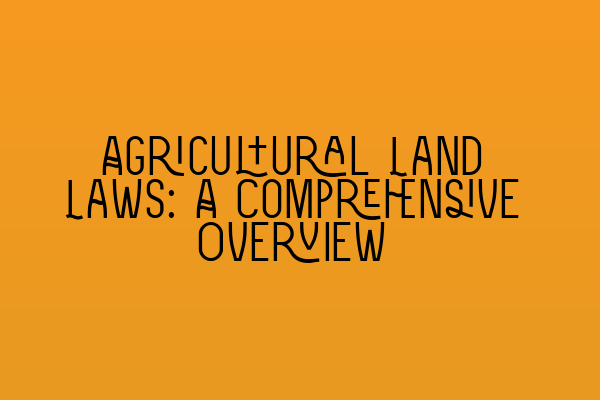**Title: Agricultural Land Laws: A Comprehensive Overview**
Welcome to SQE Property Law & Land Law’s blog! In this post, we will provide you with a comprehensive overview of agricultural land laws. Whether you are a farmer, landowner, or someone seeking to understand the legal framework surrounding agricultural land, this article will provide valuable insights and information.
Agricultural land occupies a significant role in society, supporting the production of food, preserving biodiversity, and contributing to rural economies. As such, it is crucial to understand the legal aspects that govern agricultural land use, ownership, and related transactions.
**Understanding Agricultural Land Ownership**
Before delving into the specific laws, it is important to understand the concept of agricultural land ownership. Agricultural land can be owned by individuals, partnerships, corporations, or the state. The ownership of agricultural land may come with specific restrictions and regulations that aim to protect the land and promote sustainable agricultural practices.
**Key Laws Governing Agricultural Land**
There are several laws in place that directly impact agricultural land. Let’s explore some of the most important ones:
**1. Agricultural Holdings Act 1986**
This act primarily focuses on the tenancy arrangements and rights associated with agricultural land. It addresses issues such as rent, succession, and disputes between landlords and tenants. Understanding the provisions of this act is crucial for both landowners and tenants.
**2. Town and Country Planning Act 1990**
This act outlines the planning laws that govern changes to land use, including agricultural land. It establishes the framework for obtaining planning permission, development control, and enforcement of planning regulations for agricultural activities.
**3. Wildlife and Countryside Act 1981**
This act aims to protect wildlife and preserve the natural environment. It addresses the conservation of habitats and species, including those found in agricultural land. Familiarizing oneself with the provisions of this act is vital when undertaking any activities that may directly or indirectly impact wildlife.
**4. Common Agricultural Policy (CAP)**
The Common Agricultural Policy is an EU policy that provides financial support and regulates agricultural activity within member states. Despite the UK’s departure from the EU, understanding the CAP and its implications for agricultural land remains important, particularly for farmers and landowners who may still be subject to certain CAP regulations.
**5. Environmental Stewardship Scheme**
The Environmental Stewardship Scheme promotes sustainable land management practices by offering financial incentives to farmers and landowners. By participating in this scheme, agricultural landowners can contribute to environmental conservation while receiving financial support. Familiarizing oneself with the requirements and benefits of this scheme can be advantageous for those involved in agricultural land management.
**Understanding Agricultural Land Regulations**
Apart from the key laws mentioned above, there are various regulations and guidelines specific to agricultural land. Some of these include regulations regarding subsidies, animal welfare, organic farming, diversification, and more. Staying informed about these regulations is essential for ensuring compliance and maximizing the potential of agricultural land.
**Seeking Professional Advice**
As agricultural land laws can be complex and subject to change, it is highly recommended to seek professional legal advice. Engaging a solicitor with expertise in property and land law can provide you with the necessary guidance and ensure that you comply with all relevant legislation.
At SQE Property Law & Land Law, our team of highly skilled solicitors specializes in agricultural land law. We provide expert advice and assistance to farmers, landowners, and individuals dealing with agricultural land matters. Our comprehensive range of services includes tenancy agreements, land sales and purchases, planning permission, environmental compliance, and more.
Contact us today to discuss your agricultural land legal needs and how we can assist you. Let our experienced solicitors guide you through the intricacies of agricultural land laws to protect your interests and ensure compliance.
For additional information and resources related to the SQE exams, please explore our related articles:
– [SQE 1 Practice Exam Questions](https://fqps.co.uk/sqe/sqe1-preparation/mcq-practice-quiz)
– [SQE 1 Practice Mocks FLK1 FLK2](https://fqps.co.uk/sqe/sqe1-preparation/practice-mocks-quiz)
– [SQE 2 Preparation Courses](https://fqps.co.uk/sqe/sqe2-preparation)
– [SQE 1 Preparation Courses](https://fqps.co.uk/sqe/sqe1-preparation)
– [SRA SQE Exam Dates](https://fqps.co.uk/sqe/sqe1-sqe2-exam-dates)
We hope you found this comprehensive overview of agricultural land laws informative. Stay tuned for more insightful articles from SQE Property Law & Land Law’s blog!
